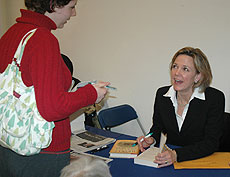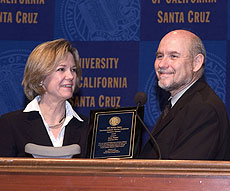March 13, 2006
Washington Post's Dana Priest receives first social sciences alumni award
By Jennifer McNulty
Called a traitor by the right and a lapdog for the administration by the left, Washington Post reporter Dana Priest has tirelessly pursued the inner workings of the Central Intelligence Agency in the post-9/11 era.
 Dana Priest signs copies of her book, The Mission: Waging War and Keeping Peace with America's Military. Dana Priest signs copies of her book, The Mission: Waging War and Keeping Peace with America's Military.
Photo: Jennifer McNulty |
 Michael Hutchison, interim dean of social sciences, presents the Distinguished Social Sciences Alumni Award to Dana Priest. Michael Hutchison, interim dean of social sciences, presents the Distinguished Social Sciences Alumni Award to Dana Priest.
Photo: Jon Kersey
|
Motivated by the public's right to know, she is unimpressed by critiques of the mainstream media.
"The government would like us to stop reporting on these issues," said Priest, who in November revealed the existence of secret CIA-run overseas prisons for suspected terrorists.
On campus to accept the first Distinguished Social Sciences Alumni Award, Priest (B.A. politics, Merrill, 1981) underscored the "value of a vibrant national security press corps that's willing to delve into these issues." Priest has also disclosed the secret international transport of terror suspects and the now-famous "torture memo" that authorized "enhanced interrogation" techniques to extract intelligence information from suspects.
"You would have none of this to think about without the mainstream media," Priest told the capacity crowd that gathered to hear her discuss "The CIA's Secret War" in the Colleges Nine and Ten Multipurpose Room on March 6. "We don't do a great job, but we do an okay job."
Priest and other veteran reporters have extensive contacts inside and outside the government, and their sophisticated use of public records and databases provides inroads to sensitive areas that the government would prefer to keep out of the news, she said.
Priest covers national security for the Washington Post and has spent two years covering the transformation of the CIA into what she describes as a "paramilitary" organization. "I'm not saying it's right or wrong, but I sure want to describe it to you," said Priest, whose story about the secret prisons recently garnered her the 2005 George Polk Award for Reporting of national news.
Although her revelations about the prisons have received widespread attention and triggered worldwide debate, Priest discussed the body of her work covering the war on terror. The base of power within the CIA has shifted to the counterterrorism center, which has tripled in size since September 11, she said.
The CIA today is conducting the largest covert operation since the height of the cold war, and each component has been "legalized" by government attorneys, said Priest, a former military reporter whose coverage of the agency has been guided by a desire to understand the scope of the "war on terror": What is the mission? What are the weapons? What is the battlefield, what is the chain of command, who has the authority, and what are the rules?
"The 'Eureka!' moment for me was when I realized the war on terror really is a global war and it involves a very deep set of relationships between the CIA and foreign liaison services," said Priest. The United States has established relationships that didn't exist before September 11 with a range of countries, including some "problem" countries that violate human rights and support terrorism, she noted.
"The world is not what it seems," said Priest, conceding that the insight took her by surprise "even after 20 years" of reporting. "Covering the CIA, I really had to step back and say, 'This is really different.'"
The CIA is working side-by-side with foreign intelligence operations that receive training and equipment from the United States, including special-forces training, vehicles, and night-vision goggles, she said. "We have created about two-dozen counterterrorism intelligence centers around the world," said Priest. "Our allies in Europe in particular have been very cooperative with the agency in counterterrorism efforts."
The government is prosecuting this war "with new laws and different kinds of forces," she said. The War Powers Resolution passed three days after September 11 gave President Bush "a huge amount of authority to determine who the enemy is," she said. Eight days after the attack, a presidential finding authorized the government to undertake covert actions. The finding was deemed so sensitive that only four to eight congressional leaders were briefed, she noted.
The "torture memo" defines torture as only those techniques that lead to organ failure, permanent physical or mental damage, or death, allowing now-familiar methods including stress positions, liquid diets, bombardment by sound and light, "water boarding," in which suspects believe they are being drowned, and exposure to extremes of heat and cold, recounted Priest. Assassination has also been recharacterized as "targeted killing," permissible because Al Qaeda "attacked us," said Priest.
Gauging the effectiveness of the war on terror has been challenging, but Priest credits the CIA with the capture or death of about 3,000 members of Al Qaeda since September 11, and she said about 75 percent of the group's pre-9/11 leadership has been displaced.
"So that's the good news," she said. "The bad news is that Iraq has created a new terrorist training ground and recruiting tool that's much more potent than bin Laden's ideology alone." Individuals who share Al Qaeda's radical ideology have been emboldened to act alone, as did the suspects in the London subway bombings, said Priest.
"Are we safer? In the short term, yes," said Priest, author of the 2003 book The Mission: Waging War and Keeping Peace with America's Military, which was a finalist for the Pulitzer Prize. "But in the long term, new networks of individual terrorists are willing to do anything against Western interests."
Wrapping up her talk, Priest emphasized that everything she had discussed was made public by the news media. "It wasn't because of government hearings, or a whistleblower on Capitol Hill, or because the government was forced to testify openly about its tactics," said Priest.
"Right now, we're confident enough to stand up to the government and say we're going to make our own decisions on this," said Priest, who worried aloud about the impact of potential staffing cuts at newspapers, which are losing readers to blogs and other information sources.
 Email this story
Email this story
 Printer-friendly version
Printer-friendly version
 Return to Front Page
Return to Front Page